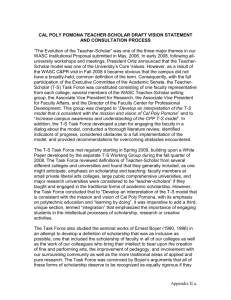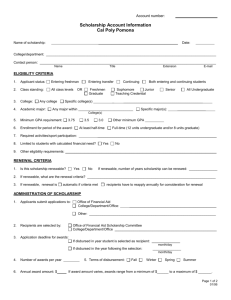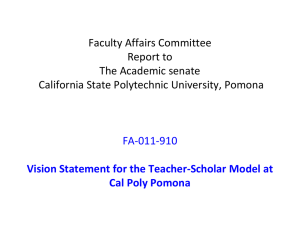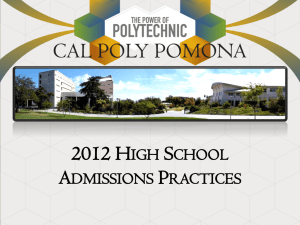first reading - Cal Poly Pomona
advertisement
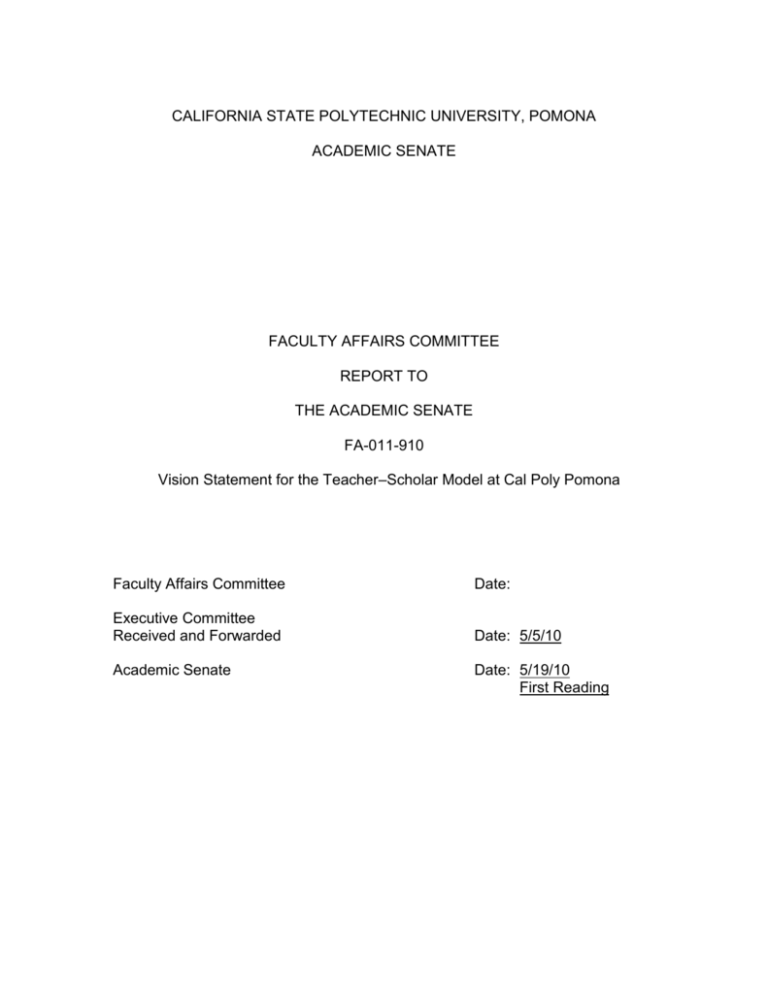
CALIFORNIA STATE POLYTECHNIC UNIVERSITY, POMONA ACADEMIC SENATE FACULTY AFFAIRS COMMITTEE REPORT TO THE ACADEMIC SENATE FA-011-910 Vision Statement for the Teacher–Scholar Model at Cal Poly Pomona Faculty Affairs Committee Date: Executive Committee Received and Forwarded Date: 5/5/10 Academic Senate Date: 5/19/10 First Reading Referral Vision Statement for the Teacher–Scholar Model at Cal Poly Pomona Background “The Evolution of the Teacher-Scholar” was one of the three major themes in our WASC Institutional Proposal submitted in May, 2006 and in early 2008, following all-university workshops and meetings, President Ortiz announced that the Teacher-Scholar model was one of the University’s Core Values. However, as a result of the WASC C&PR visit in Fall 2008 it became obvious that the campus did not have a broadly-held, common definition of the term. Consequently, with the full participation of the Executive Committee of the Academic Senate, the Teacher-Scholar (T-S) Task Force was constituted consisting of one faculty representative from each college, several members of the WASC TeacherScholar writing group, the Associate Vice President for Research, the Associate Vice President for Faculty Affairs, and the Director of the Faculty Center for Professional Development. This group was charged, among other things (see attached) to “Develop an interpretation of the T-S model that is consistent with the mission and vision of Cal Poly Pomona” and to “Increase campus awareness and understanding of the CPP T-S model”. In addition, the T-S Task Force developed a plan for engaging the faculty in a dialog about the model, conducted a thorough literature review, identified indicators of progress, considered obstacles to a full implementation of the model, and provided recommendations for overcoming obstacles encountered. The T-S Task Force met regularly starting in Spring 2009, building upon a White Paper developed by the separate T-S Working Group during the fall quarter of 2008. A draft definition was completed by the end of Spring 2009 and shared with the campus community in several ways including university wide dialog at the Fall Conference on September 21, 2009, a brown bag lunch that all faculty were invited to in order to discus and cite examples on December 3, 2009, a poster presentation and discussion at the Provost Symposium for Faculty Scholarship on December 11, 2009, When the definition was presented to the Executive Committee of the Academic Senate (EC), the EC directed that the definition should be submitted to the Senate as a referral following consultation during the Winter 2010 quarter with several groups including the University Council of chairs and the Associate Deans Council. The current version of our report (attached) incorporates changes suggested during all of these consultations. The following is intended to provide additional background on the work and intentions of the T-S Task Force. The Task Force reviewed definitions of Teacher-Scholar from several different colleges and universities and found that they generally included, as one might anticipate, emphasis on scholarship and teaching: faculty members at small private liberal arts colleges, large public comprehensive universities, and major research universities were considered to be “teacher-scholars” if they taught and engaged in the traditional forms of academic scholarship. However, the Task Force concluded that to “Develop an interpretation of the T-S model that is consistent with the mission and vision of Cal Poly Pomona, with its emphasis on polytechnic education and „learning by doing,‟ it was imperative to add a third, unique section, termed „integration‟ that emphasized the importance of engaging students in the intellectual processes of scholarship. The Task Force also studied the seminal works of Ernest Boyer (1990, 1996) in an attempt to develop a definition of scholarship that was as inclusive as possible, one included the scholarship of faculty in all of our colleges as well as the work of our colleagues who bring their intellect to bear upon the improvement of pedagogy, and involvement with our surrounding community as well as the more traditional areas of applied and pure research. The Task Force was convinced by Boyer’s arguments that all of these forms of scholarship deserve to be recognized as equally rigorous if they meet the general criteria of being new contributions to their respective fields that are peer-reviewed and publically presented according to the diversity of definitions of these activities that are recognized in the broad academic community. The Task Force sees this definition of the Teacher-Scholar as an ideal toward which we hope the University will choose to move. We see this as a lofty ideal toward which we hope many faculty will aspire and not a minimum standard that all faculty would be expected to achieve. Based on an initial survey of our colleagues we are convinced that there are many examples in recent years of faculty whose teaching and scholarship exemplify these ideals. We recognize however, that our very heavy teaching loads and limited resources pose barriers that would need to be addressed before attainment of these high goals could reasonably be expected to become common. We also recognize that one way to move toward broader attainment of these high goals would be to incorporate rewards for attainment into RTP documents. However we believe it would be contrary to our institutional culture and traditions, not to mention a violation of Appendix 16, to attempt to impose changes in RTP documents. Rather, the Task Force believes that the best way to increase the number of faculty who achieve these high ideals is to invite departments that choose to do so, to revise their RTP documents to better acknowledge and reward faculty who engage in activities that the department finds to be consistent with their own objectives and standards. Nothing in this vision of the TeacherScholar model at CPP is intended to impose changes in RTP documents, standards or expectations. It is reasonable to anticipate that WASC will expect the campus to develop a quantitative understanding of the present level of attainment of these goals and indicators of progress that can be monitored in the coming years. We know that the best way to do this will be to use indicators and reports that are already being collected rather than to place added reporting burdens on the faculty and departments. We are convinced that sufficient data to meet the expectations of WASC are already being included in the annual reports that departments have been filing for several years. Thus, we firmly believe that adopting this vision of the Teacher-Scholar will not lead to significantly increased reporting requirements or assessment activity by faculty and departments and that analysis of reports and documents already required will provide sufficient data for meeting the expectations of the University administration and WASC. Resources Faculty Affairs Committee, T-S task force, all faculty members Discussion The Faculty Affairs Committee extensively discussed the proposed Teacher-Scholar Model Vision Statement. In general, the committee members were very supportive of this statement and commend the extensive effort that the T-S Task Force has given to the preparation of the vision statement. The committee proposed a few minor modifications to the statement aimed at emphasizing the role of academic units in defining scholarship appropriate to their discipline and as in some cases as required by their accreditation agencies. Please let the committee know how you perceive these recommendations. Recommendation The FA committee recommends adoption of the vision statement by the Academic Senate and forwarding a recommendation to the President for adoption as Cal Poly’s vision for the teacher-scholar model. VISION STATEMENT FOR CAL POLY POMONA’S TEACHER-SCHOLAR MODEL DEFINITION: Teacher-Scholars at Cal Poly Pomona are role models who actively promote lifelong intentional learning to our students, are actively engaged in advancing their fields of inquiry, and are committed to blending teaching and scholarship into a single synergistic endeavor that results in a creative integration of the two roles. EXPLICATION: 1. Teaching Cal Poly Pomona Teacher-Scholars apply knowledge from the frontiers of their disciplines and pedagogical scholarships to the development of their courses and the curriculum. Teacher-Scholars: Understand current developments in their disciplines, and use this understanding to advance student learning and knowledge, Have knowledge of interdisciplinary and discipline-specific pedagogical strategies, apply effective strategies to facilitate learning of a diverse student population, use evidence-based assessment of teaching to improve their pedagogy, and evaluate and analyze their pedagogy. 2. Scholarship Cal Poly Pomona Teacher-Scholars engage in the practice of scholarship, which is specifically defined by discipline and academic unit, and is broadly construed to include the scholarship of discovery, integration, teaching, application and engagement. While the scholarship of Teacher-Scholars varies widely across disciplines at Cal Poly Pomona, it incorporates essential elements that define scholarship, including research and/or creative work. Teacher-Scholars: Make intellectual and/or creative contributions that extend and/or develop new knowledge or creative inquiry, discover, integrate or apply facts, theories, artistic perceptions, or design to practice in their disciplines, Produce work that is peer reviewed, critiqued, juried and/or judged congruent with discipline standards, and results in a publication, presentation, creative work or other product disseminated to a wider audience beyond the Cal Poly Pomona community. 3. Integration Cal Poly Pomona Teacher-Scholars integrate scholarship and teaching to create a synthesis greater than both activities. Teacher-Scholars: Bring the practice of their own scholarship into the classroom in an appropriate way, Promote a community of inquiry in their role as faculty members, and model and encourage academically rigorous scholarship as appropriate to their discipline, Foster a climate in which faculty/student scholarly, research, practice, or artistic collaboration can take place by: o enhancing student learning through meaningful experiences at Cal Poly Pomona as appropriate in their discipline through inquiry based classroom, studio, laboratory, practice and field activities that are embedded within the curriculum, o collaborating with students in a culture of learn-by-doing inquiry, discovery, professional practice and/or creative work through the involvement of students in scholarship outside of regular coursework. SCOPE: The scholarly and creative activities of Teacher-Scholars vary widely across disciplines at Cal Poly Pomona. Consistent with discipline practices, academic departments/units may adapt this vision statement to establish the standards to which Teacher-Scholars are held.
